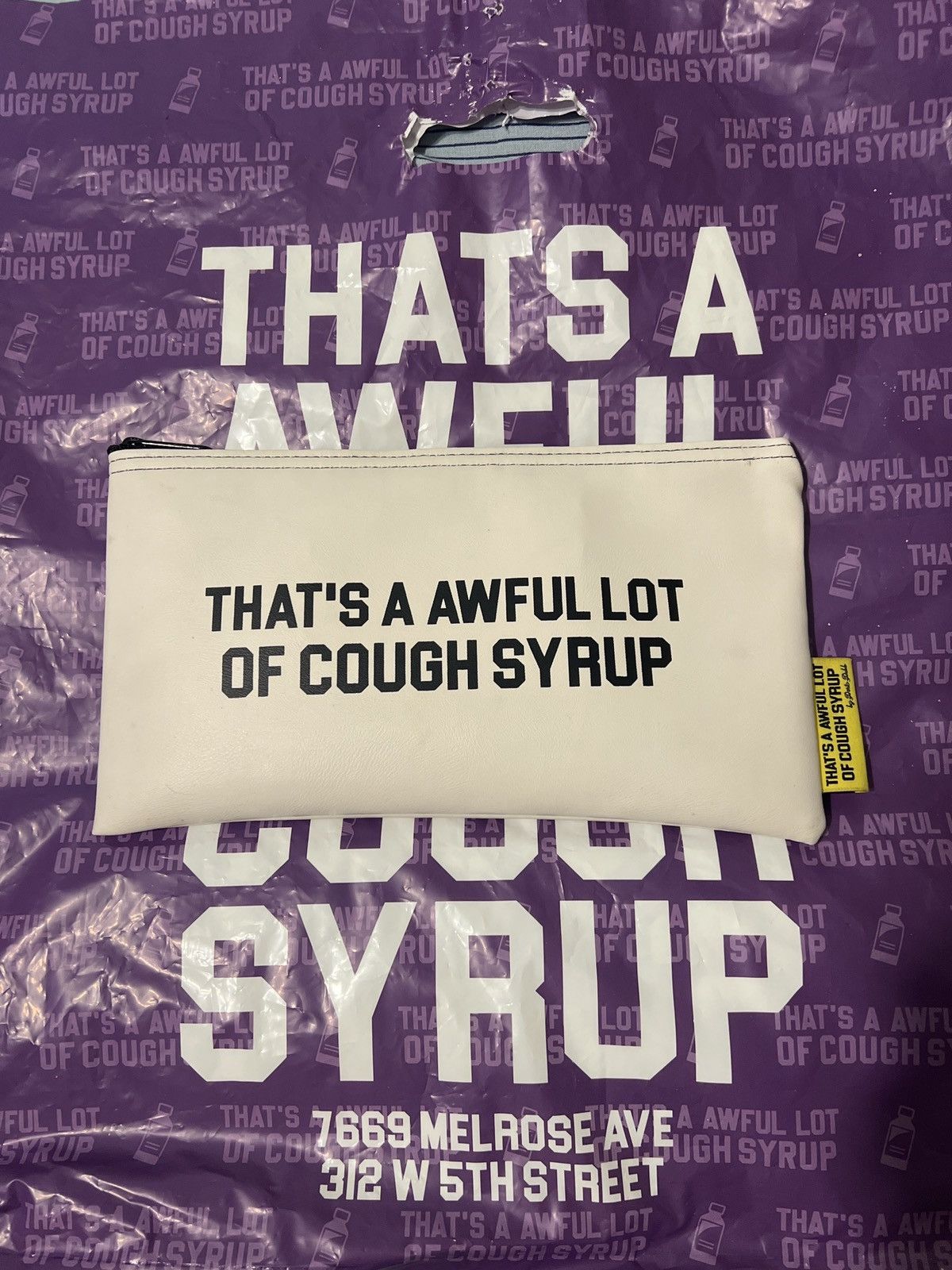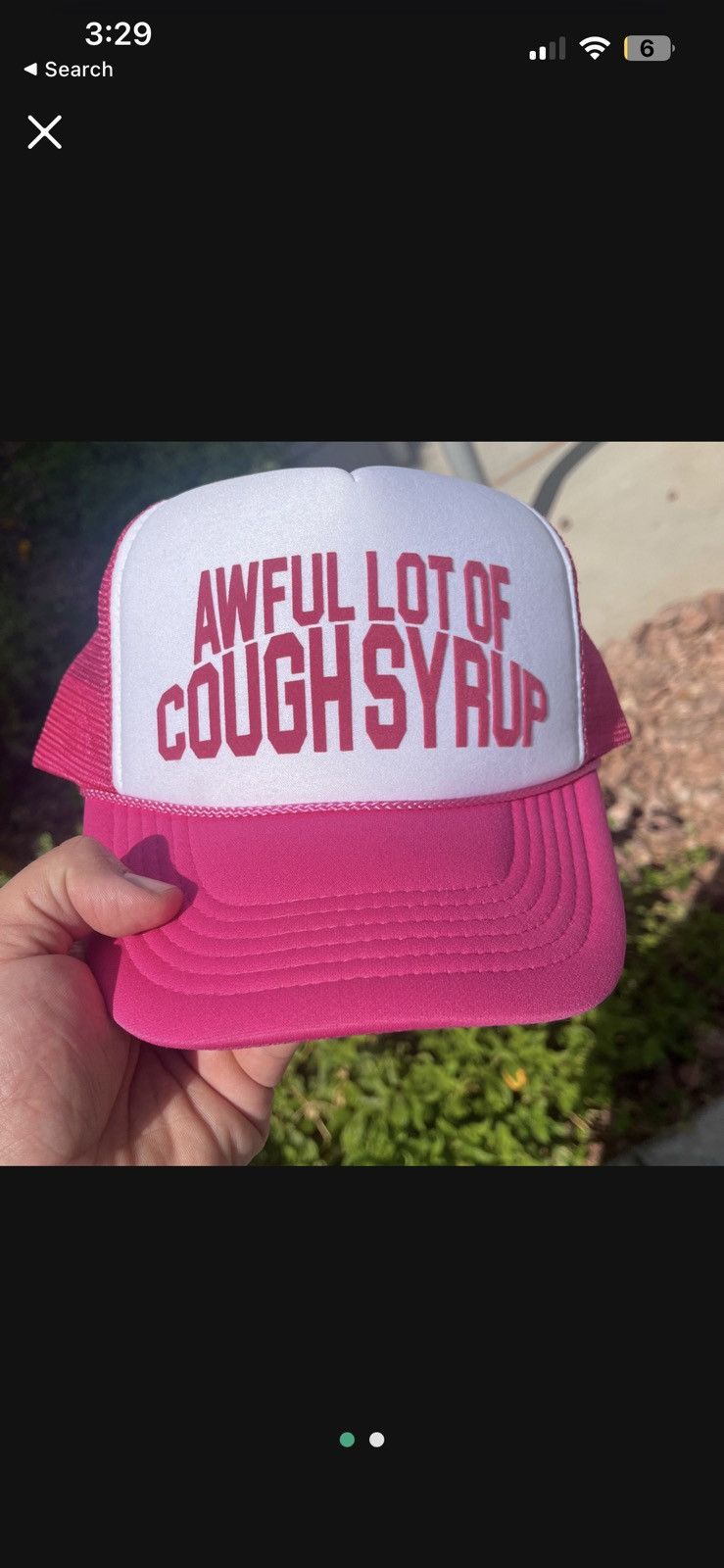That's A Awful Lot Of Cough Syrup: A Closer Look At The Overuse Of Medication
Ever wondered why people are suddenly stockpiling cough syrup like there's no tomorrow? Well, that's a awful lot of cough syrup, right? Cough syrup overuse has become a growing concern in recent years, and it's not just about relieving a sore throat. This phenomenon is sparking debates, raising eyebrows, and even leading to some serious health implications. Let's dive into the world of cough syrup and uncover the reasons behind its excessive use.
Imagine walking into a pharmacy and seeing shelves almost empty of cough syrup. It’s not just a random occurrence; it’s a trend that’s been building up over time. People are purchasing cough syrup in bulk, and it’s not always for the common cold. So, what’s really going on here? Is it a harmless habit, or is there more to this story?
Now, before we get too deep into the nitty-gritty, let’s address the elephant in the room. Cough syrup, when used properly, is a lifesaver for those pesky coughs and colds. But when it’s overused or misused, it can lead to some pretty nasty side effects. Stick around as we break down the ins and outs of this issue and provide you with all the info you need to stay safe and informed.
Read also:Ventura County Fairgrounds Your Ultimate Guide To Fun Entertainment And More
Understanding Cough Syrup and Its Purpose
First things first, what exactly is cough syrup, and why do we need it? Cough syrup is a medication designed to alleviate symptoms associated with coughs, colds, and flu. It comes in various formulations, each targeting specific symptoms. Some suppress coughs, while others help loosen mucus and make it easier to expel. Sounds pretty straightforward, right?
However, the problem arises when people start using cough syrup beyond its intended purpose. Whether it’s for recreational use, self-medication, or simply because they think more is better, the consequences can be severe. In this section, we’ll explore the different types of cough syrup and their appropriate uses.
Types of Cough Syrup and Their Ingredients
- Dextromethorphan: A common ingredient in many over-the-counter cough syrups, used to suppress dry coughs.
- Guaifenesin: Helps thin mucus, making it easier to cough up.
- Antihistamines: Often found in combination products, used to relieve allergy symptoms and reduce mucus production.
- Decongestants: Help relieve nasal congestion, often paired with cough syrup for comprehensive relief.
Each ingredient serves a specific purpose, and when used as directed, they can effectively manage symptoms. But when misused, they can lead to unwanted side effects, including dizziness, nausea, and even addiction in some cases.
Why Are People Stockpiling Cough Syrup?
Now, let’s get to the heart of the matter: Why are people buying so much cough syrup? There are several reasons behind this trend, and they’re not all related to health issues. Here’s a breakdown of the most common factors:
Self-Medication and Misinformation
One of the primary reasons for the overuse of cough syrup is self-medication. Many people believe that taking more medication will speed up their recovery, but this couldn’t be further from the truth. Over-the-counter medications are formulated with specific dosages for a reason, and exceeding these guidelines can do more harm than good.
Misinformation also plays a significant role. With the rise of social media, myths about cough syrup and its effects can spread quickly. People may hear about a “miracle cure” or a “hack” for faster recovery and jump on the bandwagon without consulting a healthcare professional.
Read also:Paige Bueckers Boyfriend The Untold Story Yoursquove Been Waiting For
Recreational Use and Abuse
Another concerning factor is the recreational use of cough syrup. Some formulations contain ingredients like dextromethorphan, which, when consumed in large quantities, can produce psychoactive effects. This has led to a rise in abuse, particularly among younger demographics.
According to the Substance Abuse and Mental Health Services Administration (SAMHSA), the misuse of cough and cold medications is a growing issue, with thousands of emergency room visits attributed to their abuse each year. It’s a serious problem that needs to be addressed through education and awareness.
The Health Risks of Overusing Cough Syrup
So, what happens when you overuse cough syrup? The short answer is, it’s not pretty. Excessive consumption of cough syrup can lead to a range of health issues, from mild discomfort to severe complications. Here’s a closer look at the potential risks:
Short-Term Side Effects
- Dizziness and lightheadedness
- Nausea and vomiting
- Drowsiness and difficulty concentrating
- Increased heart rate
These symptoms may seem manageable at first, but they can quickly escalate if the overuse continues. It’s important to recognize the signs and seek medical attention if needed.
Long-Term Consequences
Prolonged misuse of cough syrup can lead to more serious health issues, including:
- Liver damage from excessive acetaminophen intake
- Kidney problems due to prolonged exposure to certain ingredients
- Addiction and dependency on cough syrup
- Mental health issues, such as anxiety and depression
These long-term effects can have a significant impact on a person’s quality of life, making it crucial to address the issue early on.
Regulations and Efforts to Combat Overuse
Recognizing the dangers of cough syrup overuse, governments and health organizations around the world are taking steps to regulate its sale and distribution. These efforts aim to reduce misuse and ensure that cough syrup is used safely and effectively.
Restricting Access to Certain Ingredients
Some countries have implemented restrictions on the sale of cough syrups containing dextromethorphan and other potentially harmful ingredients. Pharmacies may require customers to present identification or purchase these products behind the counter, making it harder for minors and abusers to access them.
Additionally, many manufacturers have reformulated their products to reduce the risk of abuse. For example, some cough syrups now contain bittering agents that make them less appealing for recreational use.
Educational Campaigns and Awareness
Raising awareness about the dangers of cough syrup overuse is another key strategy. Health organizations are launching campaigns to educate the public about the risks associated with misuse and the importance of following dosage guidelines. These efforts aim to empower individuals to make informed decisions about their health.
Alternatives to Cough Syrup
If you’re looking for ways to manage your symptoms without relying on cough syrup, there are several alternatives worth considering. These options can provide relief while minimizing the risk of overuse and side effects.
Natural Remedies
- Honey and lemon: A classic remedy for soothing sore throats and suppressing coughs.
- Ginger tea: Known for its anti-inflammatory properties, ginger can help alleviate cold symptoms.
- Steam inhalation: Breathing in steam can help loosen mucus and relieve congestion.
These natural remedies are often gentler on the body and can be just as effective as over-the-counter medications.
Professional Guidance
If your symptoms persist or worsen, it’s always a good idea to consult a healthcare professional. They can provide personalized advice and recommend treatments tailored to your specific needs. Remember, self-medication should never replace professional medical care.
How to Use Cough Syrup Safely
Now that we’ve covered the risks and alternatives, let’s talk about how to use cough syrup safely and effectively. By following these simple guidelines, you can ensure that you’re getting the most out of your medication without putting your health at risk.
Follow Dosage Instructions
Always read the label and follow the recommended dosage. Taking more than the prescribed amount can lead to adverse effects and even overdose. If you’re unsure about the dosage, consult a pharmacist or healthcare professional.
Monitor Side Effects
Pay attention to how your body reacts to the medication. If you experience any unusual or severe side effects, stop using the cough syrup immediately and seek medical attention.
Conclusion
That’s a awful lot of cough syrup, and it’s time we address the issue head-on. Overuse and misuse of cough syrup can have serious consequences, but by staying informed and making smart choices, we can protect ourselves and our loved ones. Remember, when it comes to medication, more isn’t always better.
Take action today by sharing this article with your friends and family. Let’s work together to raise awareness about the dangers of cough syrup overuse and promote safe and responsible medication practices. And if you’re still unsure about anything, don’t hesitate to reach out to a healthcare professional for guidance.
Table of Contents
- Understanding Cough Syrup and Its Purpose
- Types of Cough Syrup and Their Ingredients
- Why Are People Stockpiling Cough Syrup?
- Self-Medication and Misinformation
- Recreational Use and Abuse
- The Health Risks of Overusing Cough Syrup
- Short-Term Side Effects
- Long-Term Consequences
- Regulations and Efforts to Combat Overuse
- Alternatives to Cough Syrup
- How to Use Cough Syrup Safely


